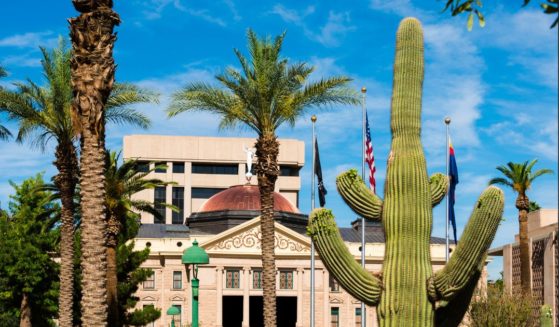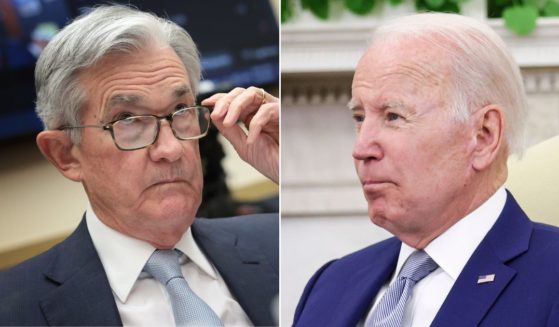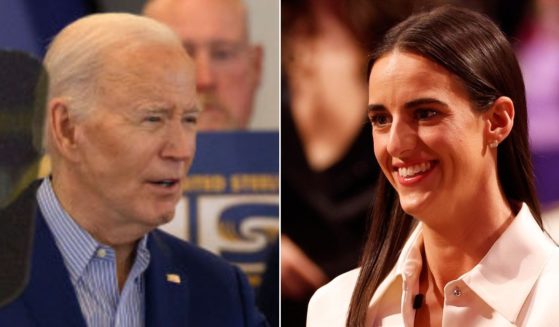Joe Biden's $5T climate plan: Net zero emissions by 2050
Democratic presidential candidate Joe Biden is pitching a $5 trillion-plus climate proposal that he says would lead the U.S. to net zero emission of carbon pollution by 2050.
The former vice president calls for $1.7 trillion in federal spending over 10 years, with the rest of the investments coming from the private sector. Biden proposes covering the taxpayer costs by repealing the corporate tax cuts that President Donald Trump signed in 2017, while eliminating existing subsidies to the fossil fuel companies.
Biden’s plan — a mix of tax incentives, federal spending, new regulation and more aggressive foreign policy on climate issues —comes as he pushes back on rivals’ assertions that his environmental agenda isn’t bold enough. Climate activists largely praised his pitch Tuesday, although some said the Democrats’ 2020 front-runner still hasn’t gone far enough to challenge the fossil fuel industry.
His proposal calls the Green New Deal pushed by some Democrats on Capitol Hill “a crucial outline” but stops short of some of its timelines for weaning the U.S. economy off power from fossil fuels, even as he promises a “clean energy revolution” nationwide and internationally.
“I will lead America and the world, not only to confront the crisis in front us but to seize the opportunity it presents,” Biden says in a campaign video posted online, warning that failure to act threatens “the livability of our planet” and will accelerate natural disasters that are “already happening.”
Biden also joined many of his Democratic primary opponents in pledging not to accept campaign contributions from the fossil fuel industry and promising to keep the U.S. in the United Nations climate agreement signed in 2015 while he was vice president under President Barack Obama. Trump, who calls climate science a “hoax,” has pledged to withdraw from that accord.
But the release of Biden’s plan was not without controversy. The campaign was forced to amend the proposal because a handful of passages did not credit some of its sources. The Biden campaign said “several citations” had been “inadvertently left out.”
Biden’s plan is similar in size and scope to what former Texas Rep. Beto O’Rourke has proposed. Its total price tag falls short of Washington Gov. Jay Inslee’s pitch for $3 trillion in federal spending over a decade and Massachusetts Sen. Elizabeth Warren’s $2 trillion green manufacturing plan, also unveiled Tuesday.
Inslee took advantage of the contrasts, saying at a Michigan campaign stop that Biden’s “proposals really lack teeth and they lack ambition that is necessary to defeat the climate crisis.” He added, “We don’t have 30 years to get this job done. We’ve got to start acting now.”
League of Conservation Voters lobbying executive Tiernan Sittenfeld was more complimentary, applauding Biden for “committing to ambitious goals.” Greenpeace, which recently released a scorecard ranking Biden second to last among Democratic candidates, called the outline “a critical step forward,” but spokesman John Noel added that if Biden “wants to become a leader on climate, he needs to outline a plan to phase out fossil fuels.”
At the pro-Green New Deal Sunrise Movement, executive director Varshini Prakash called Biden’s plan “a good start.” Prakash also gave climate activists credit for pushing Biden to the left following their outcry after a recent news report asserted Biden was looking for a “middle ground” on climate. Biden disputed the report at the time.
As president, Biden says he’d start by reversing many actions of the Trump administration, then turn to necessary congressional action and executive branch regulation, while using U.S. political and economic muscle to limit emissions from other nations.
He acknowledges that such an overhaul would affect existing U.S. energy workers — coal miners and power plant operators especially. He calls first for pension and benefit protections for all such workers and promises an “unprecedented investment” in retraining and redevelopment in those communities.
Biden recognizes the “environmental justice” movement that highlights how pollution disproportionately affects poorer, mostly nonwhite communities. He pledges a more aggressive Environmental Protection Agency, clean drinking water for all Americans and a focus on minority communities for initial rounds of federal clean energy spending.
He doesn’t offer specific spending amounts for those priorities.
Still, Biden’s dual focus on coal towns and nonwhite communities reflects political lessons from 2016 Democratic presidential nominee Hillary Clinton’s loss. Clinton drew ire in coal country when she said as part of a more sweeping statement on energy development that “we’re going to put a lot of coal miners and coal companies out of business.”
Biden also envisions expanding the nation’s railways, theoretically reducing demand for car and airline travel.
Among his ideas for automobiles, Biden calls for fuel economy standards “beyond” the Obama administration’s goal of about 54 miles (87 kilometers) per gallon (3.8 liters). The Trump administration has rolled that back, saying the regulation would increase auto prices. Biden also pitches expanded tax credits for purchases of electric vehicles, along with 500,000 more public charging stations nationwide by the end of 2030.
He calls for reducing carbon output from the nation’s buildings by more than 50 percent by 2035, through new construction and tax breaks for retrofitting existing commercial and residential properties. The Energy Department would be tasked with tightening efficiency standards for household appliances and equipment.
Like O’Rourke, Biden mentions nuclear energy as a source the federal government should boost with tax incentives. That could put him at odds with some activists on the left who cast nuclear energy as too dangerous.
On the international front, Biden calls out China as the world’s biggest coal polluter and says he’d hinge all future bilateral deals with Beijing on carbon reductions. Biden also urges an international alliance that would help other nations afford low-carbon development and pitches a global moratorium on Arctic offshore drilling.
___
Biden campaign video on the web: https://www.youtube.com/watch?v=Ku7uZ0Gok2g
___
Associated Press writers Hunter Woodall in Berlin, N.H., and Elana Schor in Washington contributed to this report.
___
Follow Barrow on Twitter at https://twitter.com/BillBarrowAP
The Western Journal has not reviewed this Associated Press story prior to publication. Therefore, it may contain editorial bias or may in some other way not meet our normal editorial standards. It is provided to our readers as a service from The Western Journal.
Truth and Accuracy
We are committed to truth and accuracy in all of our journalism. Read our editorial standards.












